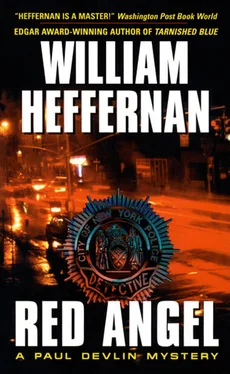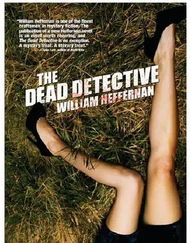William Heffernan - Red Angel
Здесь есть возможность читать онлайн «William Heffernan - Red Angel» весь текст электронной книги совершенно бесплатно (целиком полную версию без сокращений). В некоторых случаях можно слушать аудио, скачать через торрент в формате fb2 и присутствует краткое содержание. Жанр: Триллер, на английском языке. Описание произведения, (предисловие) а так же отзывы посетителей доступны на портале библиотеки ЛибКат.
- Название:Red Angel
- Автор:
- Жанр:
- Год:неизвестен
- ISBN:нет данных
- Рейтинг книги:4 / 5. Голосов: 1
-
Избранное:Добавить в избранное
- Отзывы:
-
Ваша оценка:
- 80
- 1
- 2
- 3
- 4
- 5
Red Angel: краткое содержание, описание и аннотация
Предлагаем к чтению аннотацию, описание, краткое содержание или предисловие (зависит от того, что написал сам автор книги «Red Angel»). Если вы не нашли необходимую информацию о книге — напишите в комментариях, мы постараемся отыскать её.
Red Angel — читать онлайн бесплатно полную книгу (весь текст) целиком
Ниже представлен текст книги, разбитый по страницам. Система сохранения места последней прочитанной страницы, позволяет с удобством читать онлайн бесплатно книгу «Red Angel», без необходимости каждый раз заново искать на чём Вы остановились. Поставьте закладку, и сможете в любой момент перейти на страницу, на которой закончили чтение.
Интервал:
Закладка:
“How’d he know about me?”
“I asked him that. He said my aunt told him. And if he was a friend, she would have, Paul. I wrote to her about you all the time, and she even wrote back asking questions about your job, your daughter, everything.”
“But this guy, he wouldn’t give you his name?”
“No, he said it was unwise to do that on the telephone. He said he’d meet us at the airport. When I told him this Colonel Cabrera was sending a car, he said it would be unwise to let the colonel know when I was arriving. He said the colonel worked for State Security, and was no friend of my aunt.” She stared at him, hoping he’d say something comforting. “It is strange, isn’t it?”
“Yeah, it is. I think we should just go, ourselves, and avoid both of these characters. At least for now.”
Something didn’t smell right, but Devlin didn’t want to say it. Not now. Not until she calmed down. He took her to their large, overstuffed sofa and drew her down next to him.
“Tell me about your aunt. All you’ve ever said was that she was a doctor who worked for the Cuban government, and that she and your dad didn’t get along.”
Adrianna looked at him as though confused by the question. Her features softened with thought, and Devlin realized, as he had so often before, how much he enjoyed looking at her. Adrianna’s nose was slightly too large; her mouth just a bit too wide; her light brown eyes too much in contrast with her raven-black hair, and all together it made her the most strikingly beautiful woman he had ever known.
“There really isn’t a lot I do know about her,” she said at length. “I know that sounds strange, but it’s true. My father always refused to talk about her, and when I finally got to meet her after he died, she was always very reticent about what she did. All she really ever told me was that she was a doctor who specialized in children’s problems. I do know her government sent her to several conferences at the UN and the World Health Organization, because we’d see each other during those trips. She was here eight or nine times like that, and she always stayed a week or two, so we saw a lot of each other when she was here. But that’s really all I know about her life. That, and the fact that she hated Batista, and was a fierce supporter of Fidel Castro, and everything she thought he’d done for Cuba.”
“You must know more than that,” Devlin said.
“Paul, I don’t. After my father died, she sort of adopted me from afar. I was an adult by then-” She stopped, as if considering her own words. “I guess I never recognized it before, but all our interactions were about me-her hopes for me and my work, whatever problems there were in my life. That’s all that seemed to interest her. My life. My welfare. Everything. All of it centered around me. Whenever I asked about her, she just dismissed herself as some country doctor who took care of children. All she ever wanted to talk about was me, and my problems, my hopes, my needs. I guess you could say she was more mentor than aunt.” She closed her eyes and fought back tears. “She was wonderful, Paul. She was the first real intellectual friend I ever had. The first person who ever took me seriously.”
The call from the U.S. Interests Section in Havana came as they were completing their packing. Devlin spent twenty minutes on the phone, making notes about the arrangements that had been made and listening to a detailed explanation of what they could expect to find when they arrived.
When he replaced the receiver he stood quietly, digesting what he had been told.
“What is it, Paul?”
He shook his head, a look of mild disbelief in his eyes. “I just found out a little more about your aunt,” he said.
“What did they say?”
He shook his head again. “Honey, Maria Mendez is no country doctor who just works with little kids.” He blew out a stream of air. “Up until a few months ago she was the top medical official in the Cuban government.” He paused, still digesting it all. “Adrianna, she’s one of the original heroes of the Cuban Revolution. She fought in the mountains with Castro in the fifties, and since then she’s been the closest thing they’ve had to a living saint. The people down there call her Angel Rojo , the Red Angel.”
2
HAVANA, CUBA
The international arrivals terminal at Jose Marti Airport is a sprawling, modern edifice that would befit any major city in the world. Completed in 1998, it replaced a small, dark, musty building that made arriving visitors feel they had just entered an oppressive banana republic. It is a carefully stated message, a clear abandonment of the old workers’ state, all part of a new Cuban image, intended to make tourists and foreign businesspeople believe that their much-sought-after dollars will be well spent in this former bastion of Soviet-sponsored communism.
Devlin felt slightly overwhelmed by the unexpected glitter of glass and steel, and the complete absence of expected threat left him mildly disoriented. He had telephoned his daughter-who had been left behind with his sister in Queens-just to tell her they had arrived safely in Castro’s Cuba.
“Are there guys with long beards and guns?” she had asked, her nine-year-old mind a victim of U.S. television.
“Not yet, sweetie,” Devlin had replied. “Most of the people working here are young, and the airport reminds me of the new terminals at La Guardia. Only it’s cleaner.”
His daughter had sounded disappointed.
As he and Adrianna waited for their bags to be disgorged onto a gleaming carousel, they watched other travelers unload dozens of large corrugated boxes. A fellow passenger had explained the practice. It was all part of the new dollar economy born of the U.S. embargo. Each week traveling “Samaritans” would bring in money and goods sent to Cuban nationals by relatives in the U.S. It was all done for a hefty fee-20 percent of the money and five dollars a pound for the goods, and only a few years ago it would have put everyone involved behind bars. Now, for many, it was a full-time business, which a financially strapped and desperate Cuban government chose to ignore.
When the bags arrived, Devlin loaded them on a cart and headed for a rapidly moving customs line. They had gone through passport control with only a cursory check of their documents. Devlin had expected hard-eyed inspectors who would view Americans with suspicion. Instead he had found smiling men and women, all dressed in crisp khaki uniforms, all eager to make processing as painless as possible.
Customs proved the same, a few terse questions from a pleasant young woman. It was like entering Canada from the U.S., and far less challenging than returning to the States from anywhere in the world. All U.S. customs officials, Devlin decided, should be turned over to Fidel Castro for training. If nothing else, they would learn how to manage an occasional smile.
“I’m still waiting for the storm troopers,” Devlin said as they made their way through the packed lobby toward ranks of cabs and buses that lay beyond sliding-glass doors.
“So am I.” Adrianna raised her eyebrows at the chaotic, non-threatening scene that surrounded them. It could have been any airport in any U.S. city. “This is so strange. It’s the opposite of everything I expected. And somehow it doesn’t seem real. It’s making me feel like Dorothy after she woke up in Oz.”
“Senorita Mendez. Un minuto, por favor.”
They were stopped by a short, stocky, mustachioed man somewhere in his mid-fifties. He spoke softly behind sad, weary, gentle eyes that still managed to display authority. Very much a cop’s eyes, Devlin decided.
Читать дальшеИнтервал:
Закладка:
Похожие книги на «Red Angel»
Представляем Вашему вниманию похожие книги на «Red Angel» списком для выбора. Мы отобрали схожую по названию и смыслу литературу в надежде предоставить читателям больше вариантов отыскать новые, интересные, ещё непрочитанные произведения.
Обсуждение, отзывы о книге «Red Angel» и просто собственные мнения читателей. Оставьте ваши комментарии, напишите, что Вы думаете о произведении, его смысле или главных героях. Укажите что конкретно понравилось, а что нет, и почему Вы так считаете.












